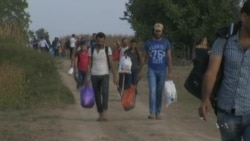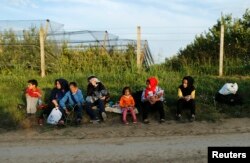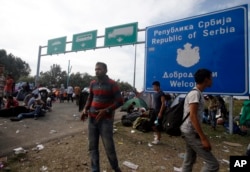The number of migrants crossing illegally into Hungary dropped steeply on Tuesday, while a few dozen were reported to have crossed into Croatia from Serbia.
The Hungarian government said Wednesday that only 366 illegal entrants were rounded up on Tuesday, the first day of operation for Hungary's strict new laws punishing people who enter the country illegally. On Monday, police said, a record 9,380 migrants crossed into Hungary.
Croatia bound
Meanwhile, the tide may have turned southward. A few dozen migrants were seen entering Croatia from Serbia Tuesday, and busloads more were seen heading that direction from the Serbian town of Presevo.
Croatian Interior Minister Ranko Ostojic said in a television broadcast discussion Tuesday that Croatia has preparations in place for the migrants and will enact an emergency plan if needed.
Also Tuesday, Serbia said it is not able to handle the vast number of migrants gathering along its borders while Hungary turns them away.
Serbia is not a "collection center," said Serbian Foreign Minister Ivica Dacic. He called it unacceptable for migrants to have to return to Serbia, especially as more and more arrive from Greece and Macedonia.
Hungary border
Hungarian officials on Tuesday closed two official border crossings because of what they said were inadequate controls on the Serbian side. Hungary also declared a state of emergency in two southern counties.
Hundreds of migrants pressed against the new barrier and demanded they be allowed in. They chanted, "Open border, open border!" while police looked on.
A young Pakistani man, Zabih Ullah, stuck on the Serbian side of the border, told VOA he wanted the police to let him cross over to Germany. He insisted that he would stay at the border until he was allowed to pass.
Germany
In Berlin, German Chancellor Angela Merkel called for a special summit to address the migrant crisis and urged European solidarity.
Merkel has said Germany is willing to absorb 800,000 migrants this year. But some European leaders blame Germany for openly welcoming migrants trying to flee war and terror in Syria and elsewhere. Germany has become increasingly frustrated with some EU members that are reluctant to share the burden.
Obama calls for cooperation
At a White House meeting with Spain's King Felipe the Sixth, President Barack Obama said the entire world has to pitch in to help the migrants.
"We agreed that this is going to require cooperation with all the European countries and the United States and the international community in order to ensure that people are safe, that they are treated with shared humanity and that we also may have to deal with the source of the problem, which is the ongoing crisis in Syria."
Obama said he told the king it is important that the U.S. also take its share of Syrian refugees.
Positive spin
A researcher at the Institute for Public Policy Research in London told VOA that to some the influx of refugees to Europe is a positive thing because it is replenishing the population of an aging continent. He said the migrants, once employed, will be supporting state health and pension systems with their taxes.
"I think [that] if you look at countries like Germany, like Spain, they are aging populations, they are shrinking populations," researcher Marley Morris said in a phone interview. "They really do need migrants in order to sustain their economies in the coming years. And, I think, that’s partly why some countries like Germany are being quite welcoming in attitude."
A lot of the migrants have skill sets and educational backgrounds that belong in the European marketplace, according to Morris.
"There are a number of [university] graduates coming over [to Europe]. There are a number of people who have ‘middle skills’ – a middle skills set - really what many of these countries like Germany really need in their labor market," said Morris. "You know, so long as these labor markets are able to integrate these newcomers into their societies, then they will be able to help sustain their economies.”
More than 430,000 migrants seeking a better life, including refugees from Syria and Iraq, have crossed into Europe this year. Migration watchers say nearly 3,000 have died trying.
Marissa Melton contributed to this report.















